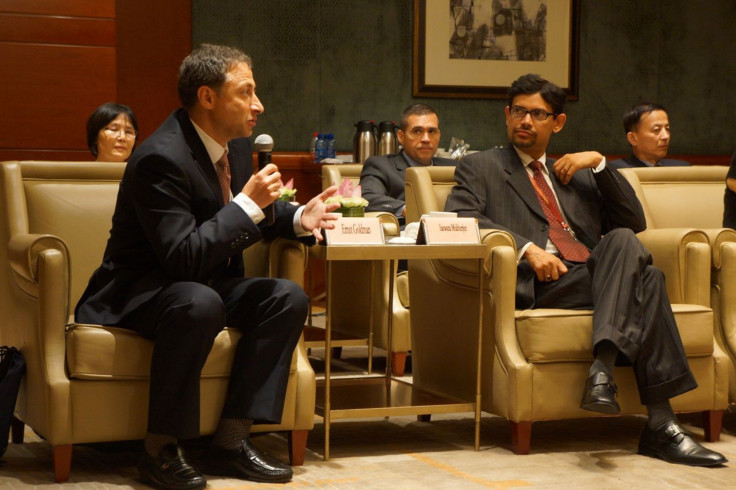Inside SERCO, The Controversial Company With A Hand In (Nearly) Everything

HANGZHOU, China -- You may not have heard of the enormous service-outsourcing corporation called Serco, but you’ve almost definitely been served by one of its many disparate branches.
The British company (London:SRP) burst onto the international stage earlier this month when it landed a U.S. federal contract worth as much as $1.25 billion to assist with the rollout of President Barack Obama’s health care overhaul.
But it has been around since 1929, when it was founded as a U.K. division of the Radio Corporation of America (RCA), eventually taking on the name Serco in 1987.
And in the decades since it has expanded its reach to all corners of the globe, providing services for industries as diverse as nuclear power, transportation, security and immigration.
From the Dubai Metro to Queen Elizabeth II’s security detail, Serco Group has its hand in many of the world’s most high-profile operations, and that prize role has equaled great success for the $7.4 billion corporation.
Serco has operations in 35 countries and employs more than 120,000 people, and as such it has been a quiet but important international player since long before the Obama administration’s controversial decision to award it the health care operation.
The International Business Times set a few minutes aside during the ChinaSourcing Summit 2013 in Hangzhou, China, earlier this month to speak with Saswata Mukherjee, chief financial officer and director of corporate development at Serco Global Services America, about the key role his company fills in the world economy.
Mukherjee has been with Serco for only a few years, but he says he is consistently impressed by the company, which also says it maintains the world standard Greenwich Mean Time and manages the 401k retirement system for all U.S. government employees.
“I’m still fascinated by what we do,” he said. “It’s a very unique company with a unique service offering.”
Mukherjee is speaking to what he described as the comprehensive approach Serco takes to providing services to companies for which it consults. Many companies, he points out, can provide one part of a service chain, but Serco finds a way to deliver the full service from end to end, supplying front-line, middle-office and back-office functions in order to streamline a contractor’s operations.
That’s the benefit of Serco, Mukherjee says, and it’s what makes the company so attractive both to him and to potential contractors.
“I don’t know of a competitor that does all of the things that we do,” he said. “We bring it all together. If you are a customer and you come to us, we’re a one-stop-shop in a way.”
But Serco’s ubiquity does have its downsides, and recent current events suggest that some issues may slip through the cracks at the colossal, global company.
As recently as two weeks ago, such a concern came to the fore as the British government discovered that Serco and G4S, the world’s largest security contractor, had charged taxpayers for the monitoring of electronic tracking tags that did not exist, some of which had been issued to dead people.
Ian Lawrence, general secretary of the National Association of Probation Officers in Britain, spoke with the Independent newspaper about the scandal, which has since culminated in an investigation by the U.K.'s Ministry of Justice and led Serco to withdraw from or delay a number of other contract tendering processes before the British government.
“We've long maintained that these companies are unfit for purpose when it comes to holding important public contracts,” Lawrence said. “The outcome of the initial investigation into G4S and Serco suggests a good deal of malpractice has been discovered.”
And criticism over Serco being awarded the lucrative contract to handle applications filed under the so-called Obamacare overhaul has been an added public relations headache for the company.
Serco plans to hire about 1,500 workers to help process the vast amount of paperwork it will be tasked with dealing with under its new contract with the U.S. government, and it just announced Friday that it will hire 600 people to staff a data-processing center in Kentucky.
Despite the new jobs the project will create -- many of which will be in the United States -- the backlash over the Obama administration picking a British company (actually the contract went to Serco Inc., a Virginia-based subsidiary of the international Serco Group, based in Hook, North Hampshire, England) enmeshed in a major government fraud scandal came fast and strong after the announcement of Serco’s selection.
Whatever your opinions on Serco, it is very hard to avoid its many tentacles in the modern world, as Mukherjee reiterated one hot July afternoon in Hangzhou.
“If you’re in Baghdad, you’ll be in good hands because we control the air traffic control tower at the international airport there,” he pointed out in between sips of tea.
© Copyright IBTimes 2025. All rights reserved.





















